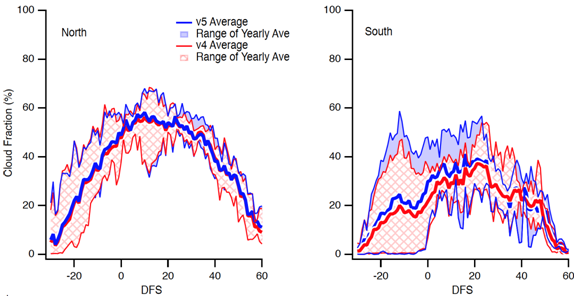|
STATUS:
09.28.2017
Instrument Status:
The spacecraft continues to perform nominally. Roll Control was implemented and CIPS has been taking good Gravity Wave images.
AIM saw the lunar transit of August 21st during two orbits. CIPS was safed for this event to prevent the spacecraft attitude control system pointing CIPS towards the sun during these events.
After the lunar transits, AIM was oriented such that the receiver warmed considerably. During this period, AIM got bitlock for 5 days continuous and for a few other outlying contacts. The Flight Operations Team took this opportunity to perform loads that will aid in future operations. This also may mean that we can get future bitlock by raising the set points of the receiver heater.
CIPS
The CIPS instrument is healthy and continues to function well. The new Rayleigh Albedo Anomaly data product from which gravity wave activity near the stratopause can be inferred was described in a recent Geophysical Research Letters article [Randall et al., 2017]. A new polar mesospheric cloud (PMC) retrieval, version 5, was developed to handle the full sun conditions into which AIM entered in 2017. Preliminary comparisons between versions 4 and 5 for several years prior to entering full sun indicate that v5 is valid for scientific analysis. The figure here shows the mean seasonal evolution of v4 (red) and v5 (blue) CIPS daily average cloud frequencies in the Northern (left) and Southern (right) hemispheres over 4 years of the mission. The x-axis in these plots is “days from solstice” or days from 21 June (left) and 21 December (right). The two data versions are very consistent in terms of morphology and variability. Version 5 has up to 2% higher cloud occurrence frequencies in the north and up to 5-6% higher frequencies in the early part of the southern cloud season. The v5 algorithm is more sensitive so slightly higher cloud frequencies are expected, and should allow for scientific analysis of PMC frequencies at lower latitudes than with v4.

|
Figure. Preliminary comparison of CIPS PMC retrievals for versions 4 and 5. The figure shows cloud occurrence frequency vs. day-from-solstice for CIPS v4 (red) and v5 (blue) in the Northern (left) and Southern (right) Hemispheres. The thick contours are averages from 2010-2013, and the color filled regions show the range of daily average values observed over the polar cap. |
Reference: Randall, C. E., et al. (2017), New AIM/CIPS global observations of gravity waves near 50–55 km, Geophys. Res. Lett., 44, 7044–7052, doi:10.1002/2017GL073943.
|
